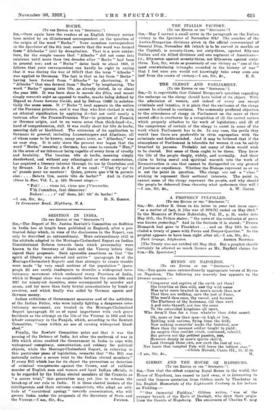SEDITION IN INDIA. [To THE EDITOR OF THE " SPECTATOR"]
Sza,—The-Report-of Mr. Justice Rowlatt's Committee on Sedition in Indite has at length been published in. England, after a pro- tracted delay which, in view of the disclosures in the Report, can only be described as extraordinary. More extraordinary still is the attitude-adopted in the Montagu-Chelmsford Report on' Indian Constitutional Reform towards facts which presumably were known to the Secretary of State and the Viceroy before they signed their proposals. Such agreeable assertions as that "the spirit of- liberty was abroad and active " (paragraph 14 of the Montagu-Chelmsford Report) and that attempts to create trouble were made "by very small sections of the population " (para- graph 21) are surely inadequate to describe a widespread revo- lutionary movement which embraced every Province, of India, which iirBengal alone was responsible between the years 1906 and 1917 for ninety-six dacoities, some accompanied by murder and arson, and for more than forty brutal assassinations by bomb-or revolver, and which finally was aided by German agents and German money.
Indian criticisms of Government measures and of the activities of the Indian Police, who were loyally fighting• a dangerous revo- lutionary movement, are treated in the Montagu-Chelmsford Report (paragraph 15) as of equal importance with such grave incidents as the attempt on the life of the, Viceroy in 1912 and the Ghadr conspiracy in the Punjab, which, according to the Rowlett Committee, "came within an ace of causing widespread blood- shed."
Finally, the Rowlett Committee- point out that it was the
passing of the Defence of India Act after the outbreak of war in 1914 which alone enabled the Government in India to cope with widespread • conspiracy, assassination, and robbery for political objects, while the Montagn-Chelmsford Report, in referring to this particular piece of legislation, remarks that "the Bill was naturally rather a severe trial to the Indian elected members." If every Bill which has for its object the prevention or detection of criminal conspiracies against the- Crown, and of ruthless murder of English men and women and loyal Indian officials, is to be regarded by the Indian elected members of the Councils as "a severe trial," this, generation may yet live to witness the break-up of our rule in India. It is these elected leaders of the intelligentsia and their extreme compatriots, who adept an atti- tude of "'casuistical apology" towards assassination, who will govern India under the proposals of the Secretary of State and










































 Previous page
Previous page